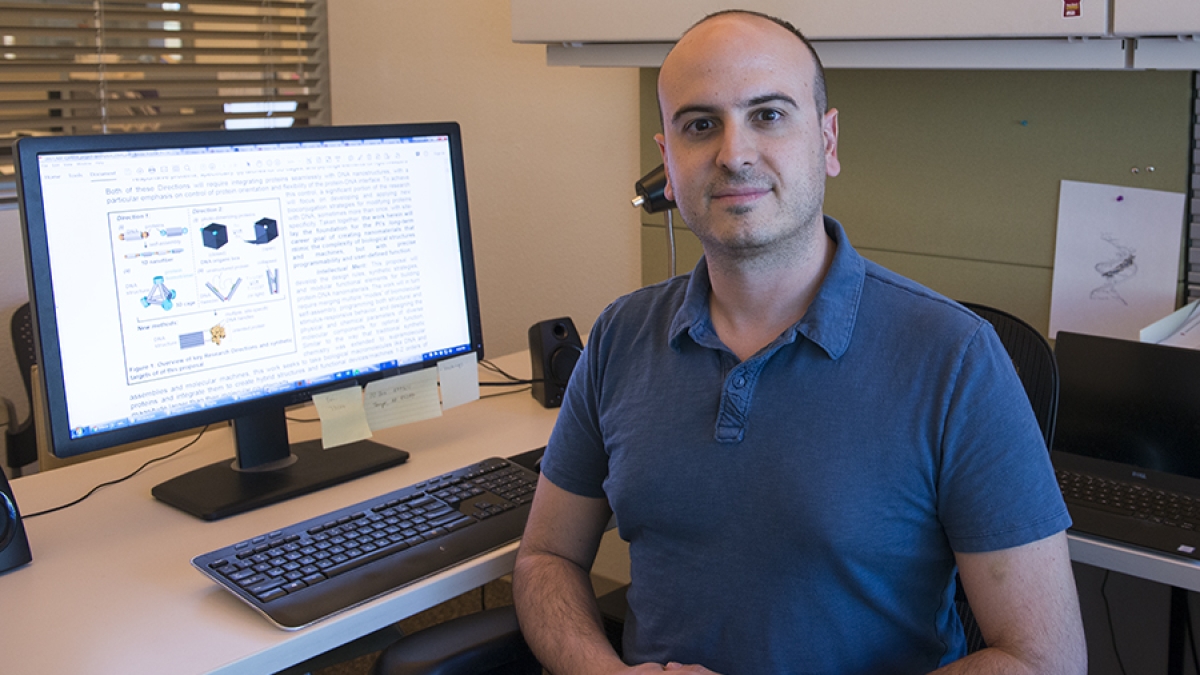ASU molecular sciences professor receives NSF CAREER Award

ASU SMS assistant professor Nick Stephanopoulos receives NSF CAREER Award.
Nick Stephanopoulos, assistant professor in Arizona State University's School of Molecular Sciences and member of the Biodesign Institute’s Center for Molecular Design and Biomimetics, has been named as a recipient of a National Science Foundation (NSF) CAREER Award.
NSF CAREER Awards are the most competitive and prestigious awards given by the NSF to junior faculty. They support teacher-scholars who effectively integrate research and education within the context of the mission of their organization. Stephanopoulos' award is titled "Hybrid protein-DNA nanostructures and devices."
Stephanopoulos' award follows closely on the heels of NSF CAREER awards for Ryan Trovitch, Gary Moore and Steve Presse in 2017.
Stephanopoulos and his group work on the design, synthesis and application of functional nanomaterials using self-assembling molecules inspired by biology. The work is highly interdisciplinary and lies at the interfaces between self-assembly, organic synthesis and bioconjugation chemistry, biology, engineering and nanoscience.
RELATED: ASU engineers earn NSF CAREER Awards
The specific goals of the NSF CAREER Award are to addresses the challenge of creating new designer materials to interface with biological systems in order to help in the treatment of disease, regrow damaged tissue or uncover fundamental mechanism of biochemical processes. Stephanopoulos and his group design and build materials using DNA and protein building blocks in smart and programmable ways. DNA structures provide unparalleled control over nanoscale structure, and proteins provide wide molecular functional diversity. By combining these two structure types, Nick and his group propose to develop novel nanofibers that mimic biological tissue, 3D cage structures that mimic viruses and structures that have functional control devices such as hinges or boxes that respond to external stimuli such as light.
Hao Yan, director of the Biodesign Center for Molecular Design and Biomimetics and also Milton D. Glick Distinguished Professor in the School of Molecular Sciences, said, “Nick is a rising star in bio-nanotechnology and brought fresh and innovative ideas to the Center of Molecular Design and Biomimetics. He has built a group of talented graduate students, postdocs and undergraduate students who are tackling important problems in the field.”
More Science and technology

Indigenous geneticists build unprecedented research community at ASU
When Krystal Tsosie (Diné) was an undergraduate at Arizona State University, there were no Indigenous faculty she could look to…

Lucy's lasting legacy: Donald Johanson reflects on the discovery of a lifetime
Fifty years ago, in the dusty hills of Hadar, Ethiopia, a young paleoanthropologist, Donald Johanson, discovered what would…

ASU and Deca Technologies selected to lead $100M SHIELD USA project to strengthen U.S. semiconductor packaging capabilities
The National Institute of Standards and Technology — part of the U.S. Department of Commerce — announced today that it plans to…